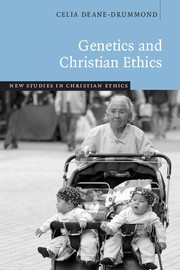Book contents
- Frontmatter
- Contents
- General Editor's preface
- Acknowledgments
- Introduction
- 1 A recovery of virtue for the ethics of genetics
- 2 Theological principles
- 3 Living in the shadow of eugenics
- 4 Genetic testing and screening
- 5 Genetic counselling
- 6 Gene therapies
- 7 Gene patenting
- 8 Women and genetic technologies
- 9 Genetics and environmental concern
- Postscript: Concluding remarks
- Bibliography
- Index
Postscript: Concluding remarks
Published online by Cambridge University Press: 05 June 2012
- Frontmatter
- Contents
- General Editor's preface
- Acknowledgments
- Introduction
- 1 A recovery of virtue for the ethics of genetics
- 2 Theological principles
- 3 Living in the shadow of eugenics
- 4 Genetic testing and screening
- 5 Genetic counselling
- 6 Gene therapies
- 7 Gene patenting
- 8 Women and genetic technologies
- 9 Genetics and environmental concern
- Postscript: Concluding remarks
- Bibliography
- Index
Summary
The tour of ethical issues in genetics with which this book grapples reveals the importance of coming to an adequate understanding of what freedom means and of the theological challenge that this poses to anthropology in a secular context. I have argued for a recovery of the virtues, in particular the cardinal virtues of prudence, justice, fortitude and temperance alongside the theological virtues of faith, hope and charity. In addition, I have suggested that the theological principles that act like a sounding-board for this discussion need to refer to wisdom, understood as both learned and a gift of the Holy Spirit. But a broader, overarching issue that encompasses even these discussions is how to express these virtues and receive these gifts. I will suggest in these concluding remarks that the milieu in which such an anthropology is rooted depends on developing an understanding of human freedom, one that is theologically informed, and also provides a counter-culture to those forms of freedom that seem to dominate the secular debate, namely those arising out of rational democratic liberalism.
Liberalist politics assumes a view of the human that is detached from commitments, but it is doubtful whether such detachment is either desirable or possible. Paul Ricoeur argues against liberalist politics on the grounds that it offers too thin a view of the human self; instead, we need to draw deeply on tradition, especially the tradition of phronēsis or practical wisdom.
- Type
- Chapter
- Information
- Genetics and Christian Ethics , pp. 245 - 258Publisher: Cambridge University PressPrint publication year: 2005

